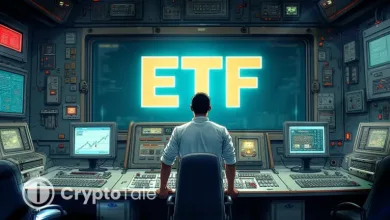Senate Republicans Unveil Draft Bill for Crypto Regulation

- Senate Republicans unveil a draft bill to regulate digital assets and boost U.S. leadership.
- The bill proposes classifying digital assets as commodities under CFTC oversight.
- A “safe harbor” provision will protect developers and ensure project transparency.
U.S. Senate Republicans have proposed a draft bill to regulate the digital asset market, aiming to make the United States a global leader in crypto regulation. The draft is an extension of the recent work in the House of Representatives and is expected to ignite a serious debate in striking a balance between innovation and oversight. Further, this bill could shape the future of crypto regulations with inputs from the industry, regulatory bodies, and political groups.
According to a press release on Tuesday, the draft bill was introduced by Senate Banking Chair Tim Scott (R-SC), Senators Cynthia Lummis (R-WY), Bill Hagerty (R-TN), and Bernie Moreno (R-OH), and is built on the CLARITY Act, which was passed by the House on July 17. Along with the discussion draft, Chairman Scott and his colleagues issued a Request for Information (RFI) for stakeholders to submit feedback on the draft and a wide range of questions.
Senator Cynthia Lummis stated that the comprehensive market structure legislation will play a pivotal role in making America the crypto capital of the world. However, the bill will require bipartisan support to pass, and its success will depend on finding common ground between political parties. Scott asserted that this will enable us to provide a clear rule for digital assets.
CFTC and SEC in New Roles
The draft bill proposes classifying most digital assets as commodities, which would be regulated by the Commodity Futures Trading Commission (CFTC). This would break the current regulatory framework, in which digital assets have frequently been in the middle between the SEC and the CFTC. Investor protections and investment contracts would be under the control of the SEC.
Further, the draft bill aims to revise the disclosure requirements of the Securities Act of 1933, which lawmakers argue is outdated and ill-equipped for handling digital assets. The bill also seeks SEC to modernize its record-keeping systems to accommodate blockchain-based financial operations aligning with Web3 innovations.
Ancillary Assets and Safe Harbor
The draft bill also includes provisions for the disclosure of ancillary assets, which are digital assets that do not qualify as securities. These amendments are designed to provide regulatory clarity for tokens operating outside traditional security classifications, ensuring such assets are treated and reported appropriately. This inclusion aims to provide clarity in how assets not classified as securities should be treated and reported.
The proposal addresses more than 35 topics, which include stablecoin regulation, decentralized finance (DeFi) exemptions, and illicit activities like fraud schemes. The bill suggests a public consultation concerning these issues, in order to balance the argument between innovativeness and consumer protection. One of the distinct characteristics of the draft is the ‘safe harbor’ clause. Under this clause, technical developers of digital asset projects would escape premature enforcement by meeting specific requirements in transparency and decentralization.
Related: Trump’s Pro-Crypto Support Grows with 2018 Senate Video Clip
Senate Eyes Digital Assets
Overall, the bill is an attempt to incorporate digital assets into the U.S. financial system. By addressing issues like DeFi, stablecoins, and regulatory frameworks, it can strengthen America’s position in the evolving digital economy.
Last week, House Republicans voted to advance the bipartisan bills on crypto. Nevertheless, the GENIUS Act was the only one that passed both houses and was signed into law by President Trump. Scott and Lummis intend to get the market structure bill through the Senate before October.
As the draft bill moves forward, it will undergo further refinement based on feedback from regulators and industry leaders and the response will play a significant role in determining the final form of the bill. If passed, the bill could make the U.S. a global leader in digital economy and be a foundational framework for the nation’s crypto policy.




